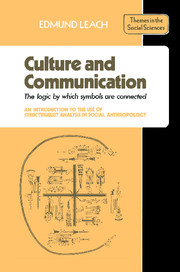 Culture and Communication
Culture and Communication Book contents
- Frontmatter
- Contents
- Culture and communication: the logic by which symbols are connected
- Introduction
- 1 Empiricists and rationalists: economic transactions and acts of communication
- 2 Problems of terminology
- 3 Objects, sense-images, concepts
- 4 Signals and indices
- 5 Transformations
- 6 Theories of magic and sorcery
- 7 The symbolic ordering of a man-made world: boundaries of social space and time
- 8 The material representation of abstract ideas: ritual condensation
- 9 Orchestral performance as a metaphor for ritual sequence
- 10 The physiological basis of sign/symbol sets
- 11 Mapping: time and space as reciprocal representations
- 12 Rank order and orientation
- 13 Examples of binary coding
- 14 Mating prescriptions and proscriptions
- 15 Logic and mytho-logic
- 16 Basic cosmology
- 17 Rites of transition (rites de passage)
- 18 The logic of sacrifice
- 19 Conclusion
- Bibliography
- Index
- Frontmatter
- Contents
- Culture and communication: the logic by which symbols are connected
- Introduction
- 1 Empiricists and rationalists: economic transactions and acts of communication
- 2 Problems of terminology
- 3 Objects, sense-images, concepts
- 4 Signals and indices
- 5 Transformations
- 6 Theories of magic and sorcery
- 7 The symbolic ordering of a man-made world: boundaries of social space and time
- 8 The material representation of abstract ideas: ritual condensation
- 9 Orchestral performance as a metaphor for ritual sequence
- 10 The physiological basis of sign/symbol sets
- 11 Mapping: time and space as reciprocal representations
- 12 Rank order and orientation
- 13 Examples of binary coding
- 14 Mating prescriptions and proscriptions
- 15 Logic and mytho-logic
- 16 Basic cosmology
- 17 Rites of transition (rites de passage)
- 18 The logic of sacrifice
- 19 Conclusion
- Bibliography
- Index
Summary
The presumed average reader of this essay is an undergraduate who is just beginning to make contact with the literature of social anthropology. Some such potential readers, and perhaps some of their teachers as well, are very likely to be put off by the formalism and superficial difficulty of the argument in the opening sections, so I must justify my presentation.
Many years ago I incurred the odium of senior anthropological colleagues by daring to suggest that other people's ethnography is often very dull. I was misunderstood but I persist in my heresy.
The work of the social anthropologist consists in the analysis and interpretation of ethnographic fact, customary behaviour as directly observed. The most fundamental way in which the procedures of modern anthropologists differ from those of their predecessors a hundred years ago is that the modern treatment of ethnographic evidence is always functionalist. Today, every detail of custom is seen as part of a complex; it is recognised that details, considered in isolation, are as meaningless as isolated letters of the alphabet. So ethnography has ceased to be an inventory of custom, it has become the art of thick description; the intricate interweaving of plot and counterplot as in the work of a major novelist (Geertz (1973)).
And if we grant that, it is plain that no detail of an anthropologist's own fieldwork could ever seem dull; detail is the very essence. But the details of other people's fieldwork are perhaps another matter.
Only in very rare instances are anthropological monographs written in such a way that the reader can pick up a comprehensive feeling for the alien cultural environment in which the events described take place.
- Type
- Chapter
- Information
- Culture and CommunicationThe Logic by which Symbols Are Connected. An Introduction to the Use of Structuralist Analysis in Social Anthropology, pp. 1 - 2Publisher: Cambridge University PressPrint publication year: 1976
